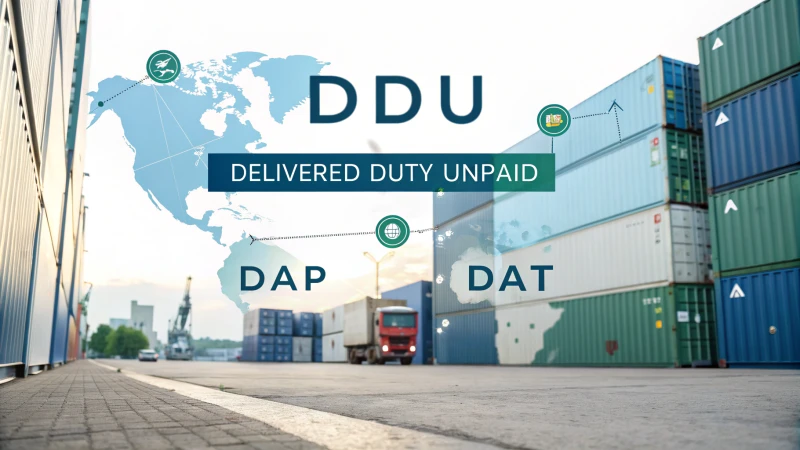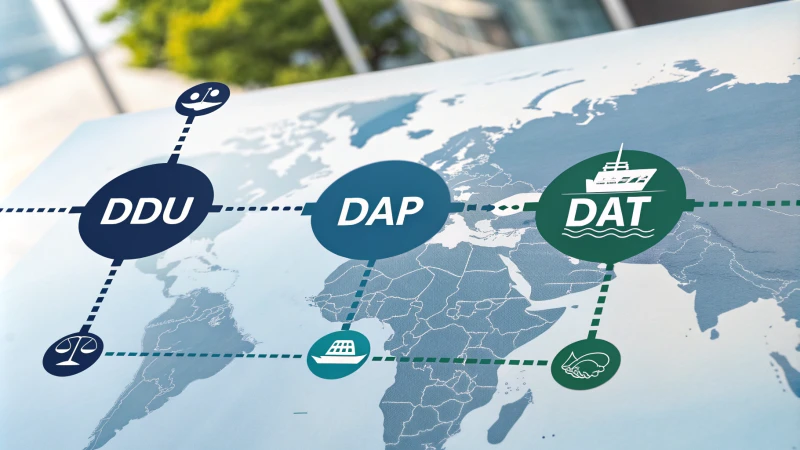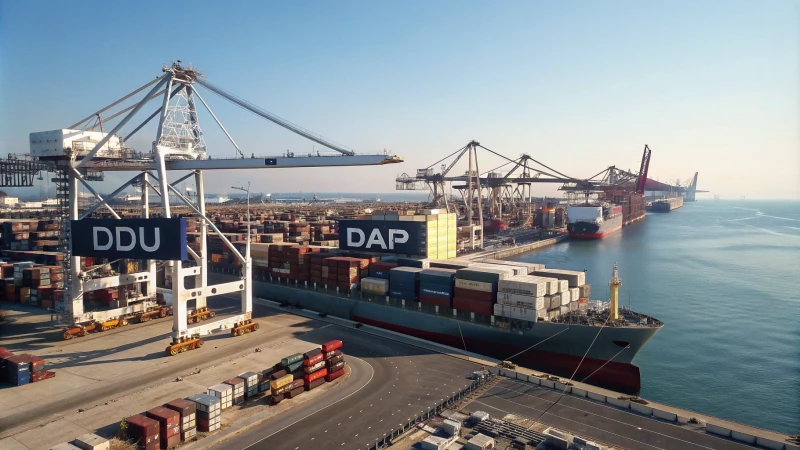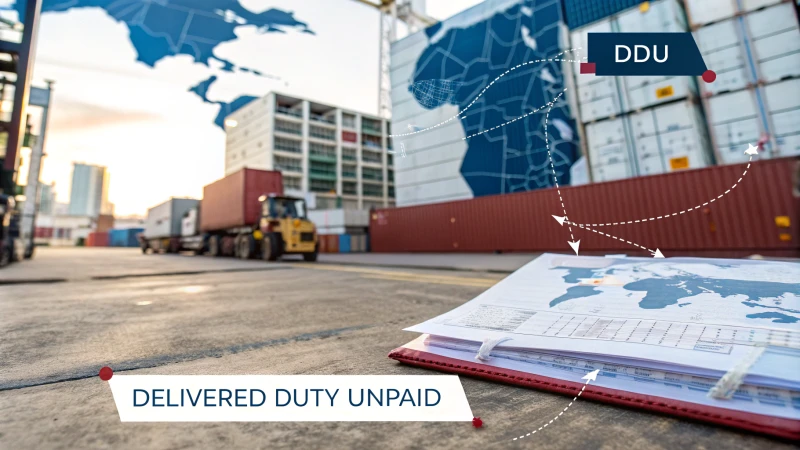Navigating the world of international shipping can feel like decoding a secret language, especially with terms like Delivered Duty Unpaid (DDU).
DDU, or Delivered Duty Unpaid, means the seller delivers goods to a specific location, but the buyer is responsible for import duties and taxes. Although replaced by newer terms in 2010, DDU's essence still influences international trade agreements.
When I first started in the import-export business, understanding terms like DDU was crucial. Imagine setting up a deal and then realizing the hidden costs when your goods arrive—taxes and duties all on you! Even though DDU has been phased out, its principles are like an old friend that still pops up in trade discussions. In this blog, we'll explore how DDU stacks up against modern Incoterms, its role in shaping shipping agreements, and why it's still a significant player for many in the industry today.
DDU was replaced by newer Incoterms in 2010.True
In 2010, DDU was replaced by terms like DAP and DAT.
Under DDU, the seller pays import duties and taxes.False
Under DDU, the buyer is responsible for import duties and taxes.
How Has DDU Evolved Over Time?
Reflecting on the evolution of Delivered Duty Unpaid (DDU) is like flipping through the pages of a dynamic trade story, one that’s deeply intertwined with my own journey in international business.
DDU, a cornerstone Incoterm until 2010, outlined sellers delivering goods without covering import duties. It transformed into DAP and DAT, mirroring shifts in logistics and trade dynamics.

The Rise of DDU in International Trade
Back when I first dipped my toes into the world of international trade, DDU was the go-to term. It was like a trusty old friend guiding me through the complexities of global transactions. Sellers, like myself, were in charge of ensuring that products reached their destination safely, leaving buyers to handle the nitty-gritty details of import duties.
The Transition to Modern Incoterms
Then came 2010, a year of change and adaptation. The International Chamber of Commerce decided to shake things up, and suddenly DDU was phased out. In its place came Delivered At Place (DAP)1 and Delivered At Terminal (DAT)2. These new terms felt more in tune with modern shipping practices, almost as if they were tailor-made for the fast-paced world we live in today.
| Incoterm | Seller's Responsibilities | Buyer's Responsibilities |
|---|---|---|
| DDU | Deliver to destination | Pay import duties |
| DAP | Deliver to location | Unload and pay duties |
| DAT | Deliver at terminal | Unload at terminal |
Current Relevance of DDU
Even though DDU has officially taken a back seat, it hasn’t entirely disappeared from the scene. Some traders, much like me on occasion, still prefer using it for certain deals where tradition and familiarity play a crucial role. However, staying informed about how DDU stacks up against modern terms3 is essential for navigating today’s trade landscape.
Practical Implications for Traders
Take Joson, for instance—a fellow trader whose journey resonates with my own. For someone importing consumer electronics in bulk, grasping these transitions is crucial. Whether to stick with the comfort of DDU or embrace the efficiency of alternatives like DAP or DAT can significantly affect costs and operational efficiencies4.
Ultimately, the shift from DDU symbolizes a broader trend in trade—one that embraces flexibility and adapts to an ever-evolving global marketplace. Understanding these changes isn’t just about keeping up; it’s about thriving in the intricate world of international commerce.
DDU was replaced by DAP and DAT in 2010.True
The International Chamber of Commerce revised Incoterms in 2010, phasing out DDU.
DDU requires sellers to pay import duties.False
Under DDU, sellers deliver goods, but buyers handle import duties.
Why Was DDU Replaced by DAP and DAT?
Navigating international shipping terms can feel like deciphering a foreign language. So, why were DDU, DAP, and DAT shuffled around? Let me take you on a journey through these changes.
In 2010, DDU was swapped for DAP and DAT to clarify and streamline the roles and risks between buyers and sellers. DAP means delivery to a specific place, while DAT focuses on terminal deliveries.

The Shift from DDU to DAP and DAT
Back in 2010, I found myself grappling with the updated Incoterms that replaced Delivered Duty Unpaid5 (DDU) with DAP and DAT. The International Chamber of Commerce made this shift to cut through the complexity that often muddled international trade responsibilities.
- DDU: I remember how DDU left many of us scratching our heads about who was supposed to handle what, especially when it came to import duties. The seller's job was done once the goods arrived, but the ambiguity over tax liabilities lingered like an unwelcome guest.
- DAP: Then came Delivered At Place (DAP), which neatly outlined that sellers had to ensure delivery to a specific location but didn't have to worry about import clearance. It was like having a GPS for logistics—clear and straightforward.
- DAT: Meanwhile, Delivered At Terminal (DAT) zeroed in on terminal deliveries, transferring risk once those goods were safely unloaded at a terminal.
Comparative Responsibilities
| Aspect | DDU | DAP | DAT |
|---|---|---|---|
| Import Duties | Buyer's duty | Buyer's duty | Buyer's duty |
| Risk Transfer Point | Delivery point | Named place | Terminal |
| Flexibility | Moderate | High | Terminal focused |
Streamlining Trade Practices
As someone deeply entrenched in importing consumer electronics from China, these changes were a breath of fresh air. Aligning with DAP and DAT has made my transactions smoother, cutting down on disputes over logistics operations.
For instance, knowing exactly where the risk transfers have helped me avoid potential delays and ensured compliance with international standards. And let's face it, in the fast-paced world of trade, that's invaluable.
Historical Context and Application
This wasn't just a bureaucratic tweak; it was a leap towards modernizing global shipping. The International Chamber of Commerce6 pushed for these changes to better mirror today's trade environment.
Embracing these new terms has not only boosted my operational efficiency but also kept me competitive in a market that's constantly evolving. Understanding these updates has become second nature, allowing me to focus more on growing my business rather than untangling shipping complications.
DDU included import duties in seller's responsibilities.False
DDU excluded import duties from the seller's responsibilities.
DAP requires sellers to handle import clearance.False
DAP excludes import clearance from the seller's responsibilities.
What Are the Key Differences Between DDU and Other Incoterms?
Picture this: you're navigating the complex waters of international trade, and every decision could make or break your business. That's why knowing the differences between DDU and other Incoterms is so vital.
DDU (Delivered Duty Unpaid) makes the seller responsible for delivering goods to a specified destination but leaves import duties and taxes to the buyer. In contrast, terms like DAP (Delivered at Place) require sellers to handle these customs duties, shifting some burden from buyer to seller.

Understanding DDU and Its Responsibilities
I remember my first big import deal; I thought I had everything covered until I was blindsided by unexpected import duties. That's when I truly appreciated understanding terms like Delivered Duty Unpaid (DDU). With DDU, the seller's job is to get the goods to a specific location, but it's up to the buyer—you or me—to handle the import duties, taxes, and customs clearance.
On the flip side, Delivered At Place7 (DAP) changes things up by having the seller handle customs clearance. It's like a weight off the buyer's shoulders in some cases.
Comparing DDU with DAP and DAT
DDU vs. DAP
- Responsibility: Under DDU, buyers handle import duties. In contrast, DAP shifts that task to sellers.
- Customs Clearance: DDU leaves customs to the buyer, while DAP requires sellers to manage it.
| Feature | DDU | DAP |
|---|---|---|
| Import Duties | Buyer | Seller |
| Customs Clearance | Buyer | Seller |
DDU vs. Delivered At Terminal (DAT)
- Delivery Point: With DAT, goods are unloaded at a terminal; DDU means delivery to a named destination.
- Duties & Taxes: Like DDU, DAT also has buyers paying duties and taxes.
Practical Implications of Choosing Between Incoterms
Choosing the right Incoterm is a bit like picking the perfect tool for a DIY project—it can make everything run smoother. For businesses like Joson's wholesale8, getting a grip on these terms means less hassle and more efficient logistics. While DDU clears up who's on the hook for import duties, newer terms like DAP could simplify customs procedures, especially if you're venturing into complex markets.
It's all about weighing factors like the nature of your goods, where they're headed, and how robust your logistics capabilities are. These choices don't just impact costs—they can redefine your entire supply chain strategy. Knowing who's responsible for import-related expenses can significantly shape contract negotiations.
For those of us wanting to stay ahead in international trade, resources like Incoterms 20209 are invaluable. Keeping informed ensures we're prepared for whatever global shipping throws our way.
DDU requires sellers to pay import duties.False
In DDU, the buyer is responsible for import duties, not the seller.
DAP shifts customs clearance responsibility to the seller.True
Under DAP, the seller handles customs clearance, unlike in DDU.
Conclusion
Delivered Duty Unpaid (DDU) indicates sellers deliver goods without covering import duties, a term replaced by DAP and DAT in 2010 but still relevant in trade discussions.
-
Learn about how DAP simplifies delivery responsibilities for sellers compared to DDU. ↩
-
Understand DAT's focus on terminal deliveries and how it differs from traditional DDU. ↩
-
Explore how DDU compares to newer terms like DAP for better decision-making. ↩
-
Discover how choosing between DDU, DAP, or DAT affects trade costs and efficiency. ↩
-
Explore the original concept of DDU and its implications for international trade agreements. ↩
-
Understand how the ICC influences global trade through standardized shipping terms like Incoterms. ↩
-
Explore detailed differences between DDU and DAP to better understand your trade responsibilities. ↩
-
Learn about effective logistics strategies that Joson might employ to improve his import processes. ↩
-
Discover comprehensive insights on Incoterms 2020 to enhance your understanding of international trade terms. ↩




